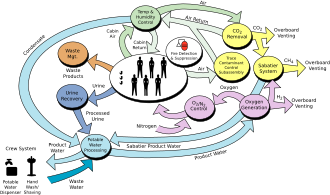ISS ECLSS

International Space Station Environmental Control and Life Support System (ISS ECLSS) refers to the collection of systems used to provide a habitable environment within the International Space Station (ISS) for the crew members. The ECLSS is designed to sustain life by controlling the spacecraft's atmosphere, providing clean water and air, and managing waste. This system is crucial for long-duration space missions, as it ensures the astronauts' survival and comfort in the harsh environment of space.
Overview[edit]
The ISS ECLSS encompasses several key subsystems, each responsible for a specific aspect of the life support requirements. These include the management of oxygen levels, carbon dioxide removal, water recovery and management, temperature and humidity control, and waste management. The system is a marvel of engineering, designed to be highly efficient and largely autonomous, minimizing the need for resupply missions from Earth.
Subsystems[edit]
Oxygen Generation and Carbon Dioxide Removal[edit]
The Oxygen Generation System (OGS) on the ISS uses electrolysis to split water into hydrogen and oxygen, providing the oxygen needed for the crew to breathe. The Carbon Dioxide Removal Assembly (CDRA) then removes carbon dioxide from the cabin air, using chemical adsorbents to scrub the gas from the atmosphere.
Water Recovery and Management[edit]
The Water Recovery System (WRS) is a critical component of the ECLSS, designed to minimize the need for water resupply from Earth. The system recycles water from various sources, including astronauts' urine, cabin humidity, and other waste water. This recycled water is then purified and made available for drinking and other uses.
Temperature and Humidity Control[edit]
The Thermal Control System (TCS) manages the temperature and humidity levels within the ISS, ensuring a comfortable environment for the crew. This system includes radiators to dissipate heat into space, as well as heaters to maintain the necessary temperature levels within the spacecraft.
Waste Management[edit]
The ECLSS also includes systems for the collection and processing of solid and liquid waste. The Waste and Hygiene Compartment serves as the ISS's toilet, using airflow to transport waste into a sanitary container. Solid waste is stored until it can be returned to Earth or disposed of in a Progress resupply vehicle that burns up upon re-entry into the Earth's atmosphere.
Challenges and Developments[edit]
Operating the ECLSS in the microgravity environment of space presents unique challenges, including the management of water and air flow without the aid of gravity. Additionally, the closed environment of the ISS requires that the ECLSS operate with a high degree of reliability and efficiency, as failures can have serious implications for crew safety and mission success.
Ongoing research and development efforts aim to improve the efficiency and reliability of life support systems for future long-duration missions, including potential missions to the Moon, Mars, and beyond. These improvements include advancements in closed-loop systems that recycle nearly all waste products and further reduce the dependency on Earth resupply missions.
Conclusion[edit]
The ISS ECLSS is a critical component of the International Space Station, enabling humans to live and work in space for extended periods. Through the continuous operation and improvement of the ECLSS, humanity takes important steps toward the goal of sustainable living in space, paving the way for the future exploration of the solar system.

This article is a space- or spaceflight-related stub. You can help WikiMD by expanding it!
Ad. Transform your life with W8MD's Budget GLP-1 injections from $75


W8MD offers a medical weight loss program to lose weight in Philadelphia. Our physician-supervised medical weight loss provides:
- Weight loss injections in NYC (generic and brand names):
- Zepbound / Mounjaro, Wegovy / Ozempic, Saxenda
- Most insurances accepted or discounted self-pay rates. We will obtain insurance prior authorizations if needed.
- Generic GLP1 weight loss injections from $75 for the starting dose.
- Also offer prescription weight loss medications including Phentermine, Qsymia, Diethylpropion, Contrave etc.
NYC weight loss doctor appointmentsNYC weight loss doctor appointments
Start your NYC weight loss journey today at our NYC medical weight loss and Philadelphia medical weight loss clinics.
- Call 718-946-5500 to lose weight in NYC or for medical weight loss in Philadelphia 215-676-2334.
- Tags:NYC medical weight loss, Philadelphia lose weight Zepbound NYC, Budget GLP1 weight loss injections, Wegovy Philadelphia, Wegovy NYC, Philadelphia medical weight loss, Brookly weight loss and Wegovy NYC
|
WikiMD's Wellness Encyclopedia |
| Let Food Be Thy Medicine Medicine Thy Food - Hippocrates |
Medical Disclaimer: WikiMD is not a substitute for professional medical advice. The information on WikiMD is provided as an information resource only, may be incorrect, outdated or misleading, and is not to be used or relied on for any diagnostic or treatment purposes. Please consult your health care provider before making any healthcare decisions or for guidance about a specific medical condition. WikiMD expressly disclaims responsibility, and shall have no liability, for any damages, loss, injury, or liability whatsoever suffered as a result of your reliance on the information contained in this site. By visiting this site you agree to the foregoing terms and conditions, which may from time to time be changed or supplemented by WikiMD. If you do not agree to the foregoing terms and conditions, you should not enter or use this site. See full disclaimer.
Credits:Most images are courtesy of Wikimedia commons, and templates, categories Wikipedia, licensed under CC BY SA or similar.
Translate this page: - East Asian
中文,
日本,
한국어,
South Asian
हिन्दी,
தமிழ்,
తెలుగు,
Urdu,
ಕನ್ನಡ,
Southeast Asian
Indonesian,
Vietnamese,
Thai,
မြန်မာဘာသာ,
বাংলা
European
español,
Deutsch,
français,
Greek,
português do Brasil,
polski,
română,
русский,
Nederlands,
norsk,
svenska,
suomi,
Italian
Middle Eastern & African
عربى,
Turkish,
Persian,
Hebrew,
Afrikaans,
isiZulu,
Kiswahili,
Other
Bulgarian,
Hungarian,
Czech,
Swedish,
മലയാളം,
मराठी,
ਪੰਜਾਬੀ,
ગુજરાતી,
Portuguese,
Ukrainian